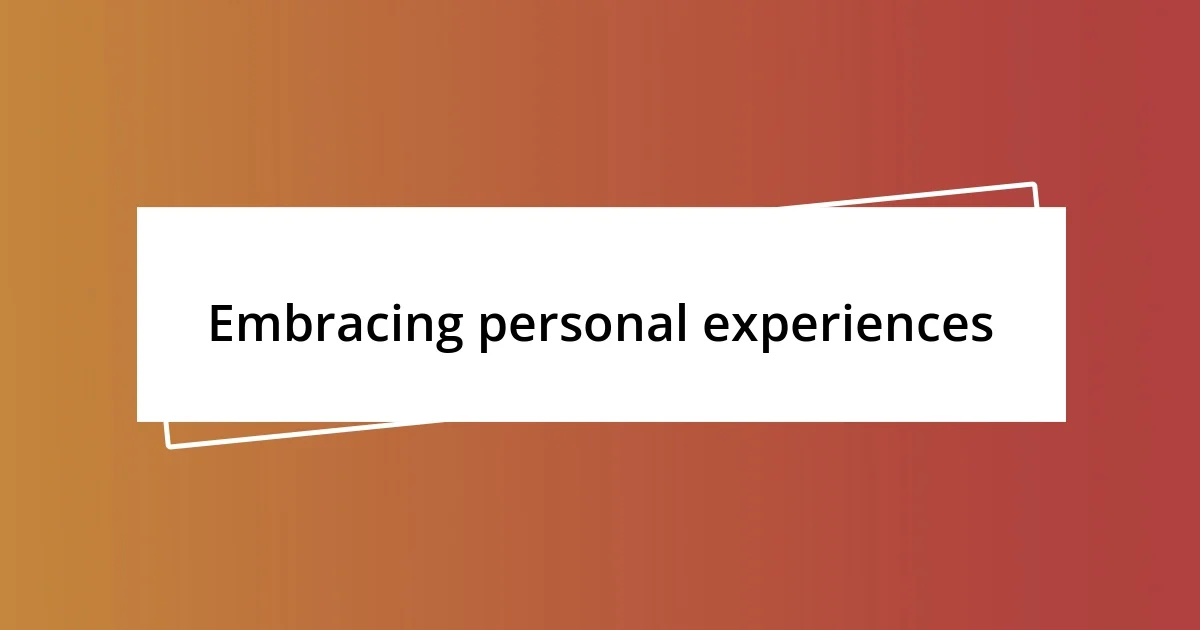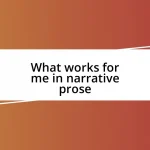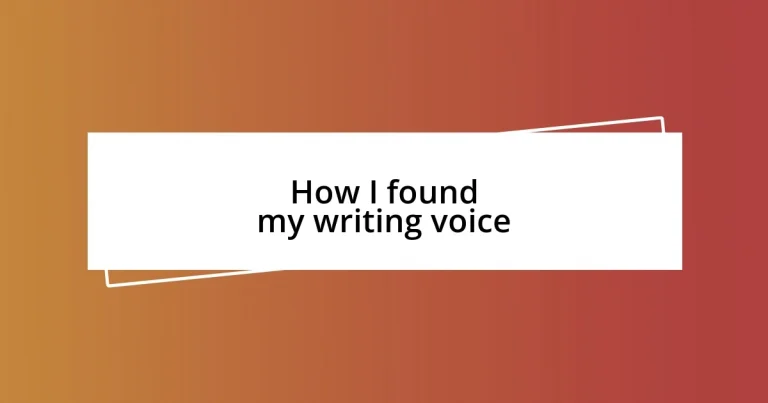Key takeaways:
- Discovering one’s unique writing style often begins with self-exploration, personal experiences, and vulnerability, as sharing stories can lead to powerful connections with readers.
- Diversifying writing genres, including poetry, memoir, or blogging, enables writers to express complex emotions and uncover new facets of their voice.
- Seeking feedback from peers is crucial for growth; it provides fresh insights that can enhance storytelling and help refine one’s writing voice over time.

Understanding your unique style
Understanding your unique writing style is like uncovering a hidden gem within yourself. I remember the first time I shared a piece of my writing at a local workshop. The feedback was overwhelming, and it hit me—my voice resonated with others! This moment made me realize that everyone has a distinct style just waiting to be discovered and embraced.
Think about your favorite authors—what draws you to their words? Is it the way they express emotions or their unique choice of topics? For me, it was the heartfelt confessions of a memoirist that inspired my own vulnerability in writing. This led me to explore my own stories and experiences more deeply, revealing a voice that felt authentically mine. Isn’t it fascinating how our preferences can guide us to our individual styles?
As you ponder your own unique style, consider keeping a journal. I found that free writing helped me tap into thoughts I didn’t even know I had, illuminating the essence of my voice. Have you ever experienced that moment when the words flow effortlessly? That’s a clear sign you’re connecting with your true self, and it’s where your unique style starts to shine.

Exploring different writing genres
Diving into different writing genres can be an exhilarating adventure. I recall when I first experimented with poetry; it felt like opening Pandora’s box. Each word seemed to dance on the page, allowing me to express feelings that prose simply couldn’t capture. This exploration not only broadened my writing toolkit but helped me articulate complex emotions in succinct ways.
Here are some genres to consider exploring:
– Fiction: Crafting stories that weave vibrant characters and plots.
– Non-fiction: Sharing real-life experiences and insights that can inspire others.
– Poetry: Expressing feelings and ideas in a rhythmic or concise form.
– Memoir: Reflecting on personal experiences that shape your voice.
– Blogging: Engaging with readers in a casual, conversational manner.
Each genre has its own flavor and can lead you to discover aspects of your writing voice that you may not have recognized before. I encourage you to try them out because you never know which one will resonate deeply with you.

Embracing personal experiences
Embracing personal experiences is an essential part of finding your writing voice. I vividly recall a moment when I decided to share a challenging chapter from my life in an online forum. The vulnerability was nerve-wracking, yet the response was eye-opening. Many readers reached out, sharing their own stories and connecting with my experience. This taught me that our struggles can forge powerful connections through writing, transforming personal pain into collective understanding.
It’s incredible how tapping into your life’s moments can strengthen your narrative. I remember during a family gathering, a simple story about my grandmother’s knitting led to a heartfelt exploration of memories that shaped me. These seemingly mundane experiences became rich material for my writing. When I allowed my past to inform my craft, I discovered layers to my voice I never knew existed.
Sometimes, I find myself reflecting on the lessons forged through past experiences—loss, triumph, and everything in between. Each story uniquely colored my voice and made it more relatable to others. Have you ever felt a surge of emotion while recounting a personal incident? That rawness can be the heartbeat of your writing, inviting readers to share in your journey.
| Experience | Impact on Writing Voice |
|---|---|
| Sharing personal struggles | Creates connections with readers through shared vulnerability |
| Recounting family stories | Uncovers emotional depth and authenticity in storytelling |
| Reflecting on past lessons | Infuses narratives with wisdom, making them relatable and impactful |

Practicing free writing techniques
Practicing free writing techniques can be a liberating experience. I remember my first attempt at free writing; I set a timer for ten minutes and let my thoughts spill onto the page without any filters. The words flowed like a river, and I was surprised to uncover ideas that had been hidden deep within me. That unstructured approach not only warmed me up for more serious writing but also helped me tap into emotions I never knew I had.
One powerful free writing exercise I’ve tried involves choosing a random word and writing about it without stopping for a specified period. For instance, I once picked “ocean” and began to reflect on childhood memories of family beach trips. The process transported me back to those sun-soaked days, and suddenly, I was writing about my fears of the water and the solace I found in the waves. Have you ever noticed how just one word can unlock a flood of memories? This technique allows me to explore various themes that resonate with my personal experiences, ultimately shaping my voice.
It’s fascinating how free writing can dissolve the barriers of self-criticism. I used to worry a lot about my writing being “perfect.” However, through free writing, I learned to quiet that inner critic. I realized that the value lies in the raw expression of thoughts. Some of my favorite phrases and ideas have emerged from those messy drafts, reminding me that vulnerability often leads to authenticity. What insights might you uncover if you allowed yourself to write without judgment?

Seeking feedback from peers
Seeking feedback from peers has been a game-changer in my writing journey. I remember sharing a draft with a fellow writer, feeling anxious about their thoughts. Their constructive critique unveiled blind spots I hadn’t noticed, ultimately guiding me toward clarity and stronger storytelling. It’s funny how a different perspective can illuminate your own work—have you ever felt that rush of realization when someone points out something you overlooked?
I’ve also come to appreciate the variety of insights that emerge when sharing my work within diverse groups. During a workshop, I was surprised by a comment from a poet who saw metaphors in my prose that I hadn’t intended. This sparked a deeper exploration of my writing voice, revealing layers I didn’t recognize. I often wonder how many hidden gems are waiting to be discovered through collaboration and dialogue.
In my experience, peer feedback can sometimes feel daunting, but it’s invaluable. I vividly recall a moment when I felt vulnerable sharing a personal essay. Yet the encouragement and suggestions I received from my writing group not only boosted my confidence but also made my piece resonate more with others. Have you ever experienced a moment where feedback transformed your narrative? Those moments remind me that we grow as writers when we embrace communal learning.

Refining your voice over time
Refining your writing voice is an ongoing journey, one that evolves as you continue to write and reflect on your work. I recall a time when I stumbled upon an old journal while looking for inspiration; reading my earlier pieces felt surreal. The voice I projected back then was so different from who I am today, shaped by experiences and insights gained over time. Isn’t it fascinating how our voices mirror our growth and changing perspectives?
One pivotal moment for me was while participating in a monthly writing challenge. Each prompt pushed me out of my comfort zone, forcing me to experiment with tone and style. I remember writing a humorous piece about a day in my chaotic life, where every mishap made me laugh at my own expense. That was liberating! It became clear to me that humor was a vital part of my voice, and I had the power to make light of even the worst days. Have you had a moment where exploring a different style unlocked a part of your voice you didn’t know existed?
As I’ve immersed myself in diverse genres and audiences, I’ve realized that each writing experience chips away at the layers of my voice, exposing more authenticity. I used to mimic writers I admired, desperately trying to fit their styles into my work. But over time, I learned that my unique experiences and perspectives were my greatest assets. That realization was even a little emotional—embracing my distinct voice felt like finally allowing an old friend to take the stage after years of silent support. What has shaped your writing voice over time? It may just surprise you how much you’ve grown.

Connecting emotionally with readers
Connecting emotionally with readers is, to me, one of the most rewarding aspects of writing. I’ll never forget the first time someone reached out after reading a deeply personal story I shared. Their heartfelt message, expressing how they related to my experiences, made me realize that vulnerability can create bridges between us as writers and our audience. Have you ever felt that connection, where your words resonate with someone’s heart? It’s as if you’re sharing a piece of your soul, and in that moment, you’re not alone.
I find that tapping into my own emotions allows readers to feel something genuine. During a phase in my life filled with uncertainty, I poured my feelings into a piece about fear and hope. Revisiting those emotions on the page was cathartic, and when I shared it, I was blown away by the flood of responses from readers who felt the same way. It made me wonder: how often do our struggles unite us in ways we can’t always articulate?
There’s something profoundly powerful about authenticity. One time, I wrote a letter to my younger self, filled with both regret and acceptance. I hesitated to share it, but when I did, the feedback was overwhelming—so many people encouraged me to embrace that raw honesty. I realized that when I’m open about my vulnerabilities, it invites others to be authentic too. Have you ever written something that felt so true to you that it sparked a conversation or reaction you hadn’t anticipated? Those moments fuel my passion for writing and deepen my understanding of connection.














